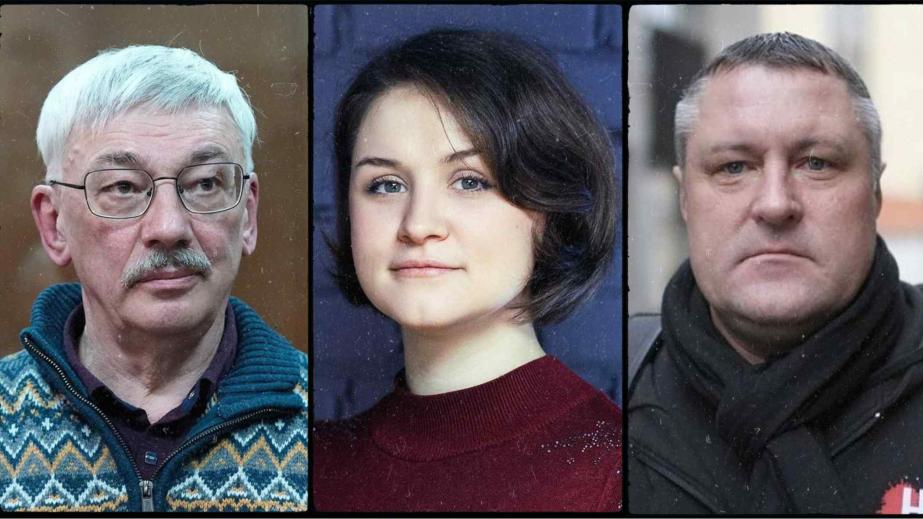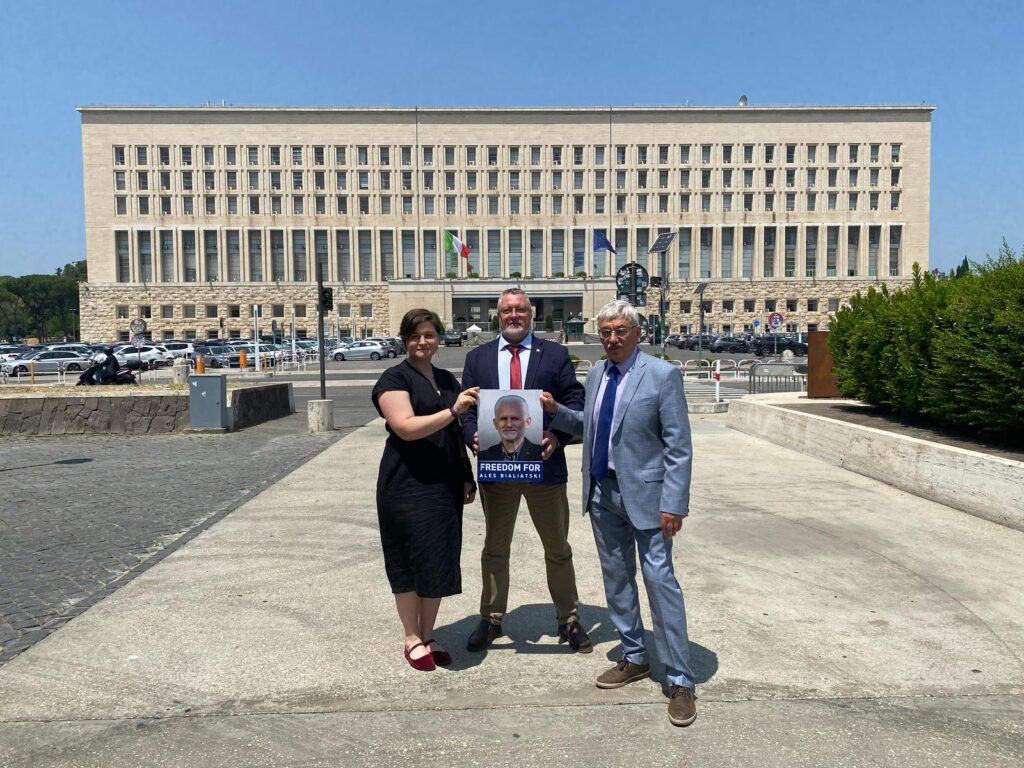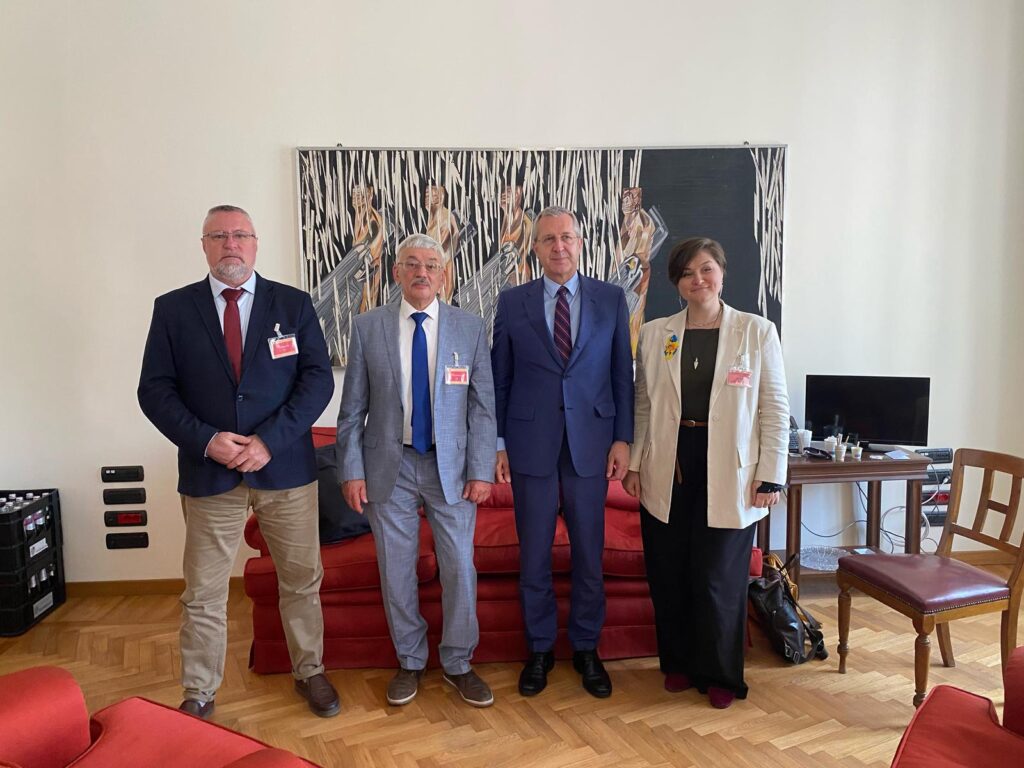People First. Oleksandra Romantsova during her diplomatic visit to Italy

On June 9-11, Oleksandra Romantsova, Executive Director of the Center for Civil Liberties, attended several events in Rome, Italy, to present the People First campaign. Along with her, human rights activists Leonid Sudalenka, head of the Gomel branch of the Belarusian organization Viasna, and Oleg Orlov, co-chair of the Memorial Human Rights Center, spoke about the release of all people illegally held in captivity or deported by Russia.
The People First campaign calls for the release of prisoners of war as a result of the Russian invasion. These include: thousands of Ukrainian civilians held by the Russian government; thousands of Ukrainian and Russian prisoners of war held by both sides; thousands of Ukrainian children forcibly displaced or deported to Russia; and hundreds of Russian political prisoners imprisoned for protesting the war.
Among the campaign’s demands:
- In accordance with international law, all Ukrainian civilians captured and illegally detained by the Russian armed forces, including those convicted by Russian courts, must be immediately released unconditionally and allowed to return home. Those people whose homes are in Russian-controlled areas should be allowed to leave for Ukrainian government-controlled territory if they so choose.
- All illegally transferred or deported children should be returned to Ukraine.
- All possible efforts should be made to return prisoners of war to their homeland as soon as possible through exchanges or other means. The Geneva Conventions require immediate repatriation after the end of active hostilities, but work in this direction should begin immediately.
- Russian political prisoners who have been sentenced to imprisonment or are in pre-trial detention in connection with their anti-war statements or actions should be released and not be hindered in their freedom of movement, including leaving the country if they so wish.
- An independent international mechanism should be established to coordinate these processes, monitor their compliance with international humanitarian law, and report regularly and transparently on progress, including regular information on the release of prisoners and compliance with humanitarian standards.
- Russia must immediately grant UN agencies and the ICRC full access to all prisoners and all illegally displaced or deported children.

Over forty Ukrainian and international organizations, including Memorial Italia and the Italian Federation for Human Rights, supported the People First campaign.
On June 9, the delegation met at the Ministry of Foreign Affairs with the Directorate General for Political and Security Affairs to highlight the grave human rights violations in Ukraine, Russia, and Belarus and to present the People First campaign. The officials present at the meeting assured her of the continued commitment of Italy and its government to protecting human rights worldwide, including in the countries where the three NGOs operate. Pisoia met with Benedetto Della Vedova, former Deputy Minister of Foreign Affairs and member of the Chamber of Deputies’ Committee on Foreign and Public Affairs. In Rome, he spent a long time with the delegation to discuss some issues related to Italian and international support for activists from the three countries.
On June 10, human rights defenders held a hearing at the Foreign Affairs and Communities Committee of the Chamber of Deputies on the release of people imprisoned or deported since the beginning of the Russian-Ukrainian war. The discussion was broadcast live on a TV channel, followed by meetings with the heads of factions in the Italian Parliament.
Later that day, the Institute of International Relations hosted a meeting, “Putin’s Russia and the War Against Ukraine: Ideas of Human Rights Defenders”, which was attended by a whole house of listeners. The event was also available to the public via live streaming. Oleksandra Romantsova, Leonid Sudalenko, and Oleg Orlov shared their personal reflections on the state of Putin’s Russia, the destructive war against Ukraine, and human rights violations in the region. They also told the Italian society about the PeopleFirst campaign in more detail.
On June 11, the delegation took part in a joint prayer service with the Pope and had the opportunity to introduce themselves to the pontiff. Later that day, the delegation spoke during a hearing in the Senate of the Italian Republic, which senators from the Security Committee and the Senate International Committee attended.
“I visited Italy as a representative of a Ukrainian organization that deals with the release of civilians illegally detained and prisoners of war, as well as the return of children. I presented the whole situation in Ukraine as a problem for international humanitarian law, as an example of disrespect by the Russian Federation.
In addition, we talked about other forms of attacks that Russia is carrying out as part of its hybrid warfare. For example, propaganda and cyberattacks are dangerous, including for states such as Italy. We wanted not only to arouse the sympathy of Italian MPs so that they would help Ukraine more, but also to make them realize the potential danger of these precedents for Italian society. We discussed this in the Parliament’s lower and upper houses.

Since he is a new pope, the idea of meeting with the Pope arose to address the issue of the Russian-Ukrainian war. However, from our observations, he is well-versed in the context.
We also had a meeting with various journalists to emphasize the need to support the priority of releasing civilians, prisoners of war, and returning children within the negotiations. We explained that the Russian Federation has not released anyone from our list of people who are still in captivity, whose health is completely destroyed, and who need help. And this must be clearly understood: the difference between what Russia promises and what it actually does.We heard a very deep understanding from some senators and parliamentarians who have been dealing with the issue of our people’s return since 2014. We also saw a deep awareness from Italian journalists. In other words, we see that people who influence the public are actively working on the Ukrainian issue and do not let it be forgotten,” says Oleksandra Romantsova.

